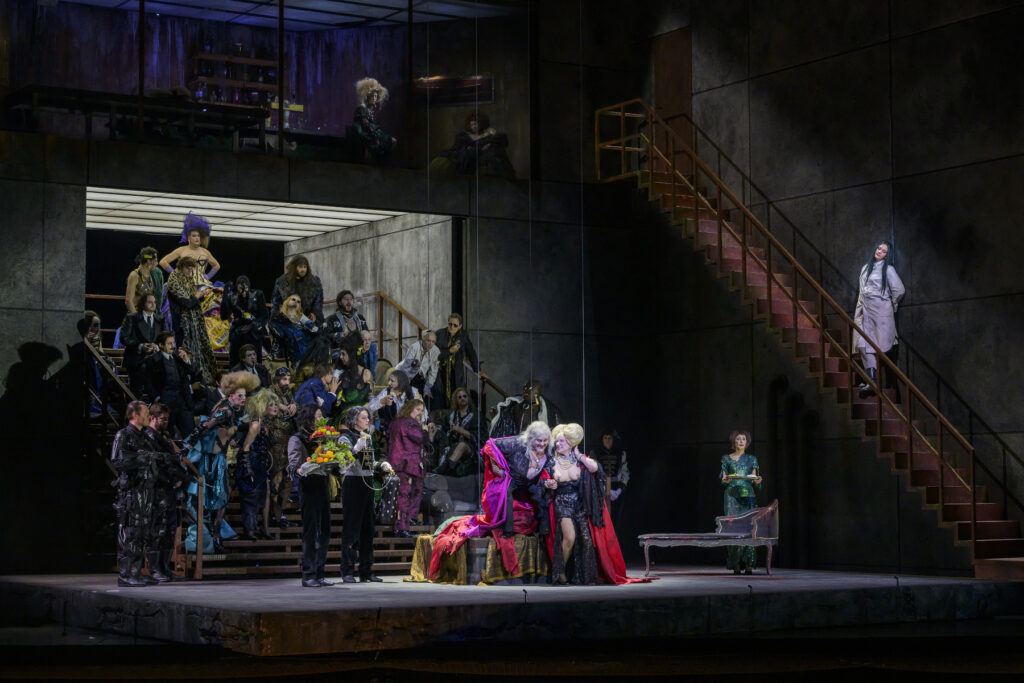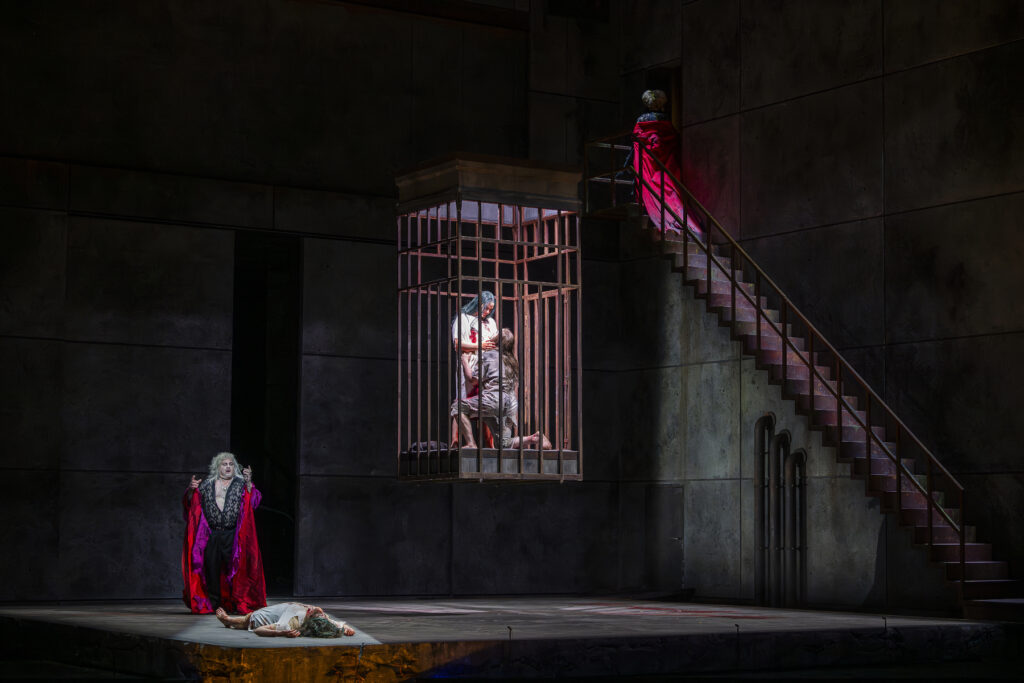Over a century after its 1905 Dresden premiere, Richard Strauss’s Salomé still has the capacity to disturb. Given that audiences have pretty much seen everything on the operatic stage, should we be surprised? Should a director aim to continue a tradition of pushing the boundaries of acceptability? When Opéra Bastille’s new production of the work came to Paris in 2022, courtesy of American director Lydia Steier, trigger warnings were issued about its graphic content. A member of the press declared ‘Operatic Shock Treatment’, and for at least one of its performances booing could be heard. This first revival, in the capable hands of Victoria Sitjà, is possibly no less shocking, but judging from those around me last Sunday afternoon, one might have been forgiven for thinking the only shock was how little the audience seemed to be unsettled, wowed, I suspect, more by the absolute conviction and authority of the performance than the sexually explicit content they were witnessing.
There’s nothing new in simulated sex on stage, or gang rape, although the Royal Opera House’s William Tell raised dozens of complaintsin 2015 when its director Damiano Michieletto decided to underline so vividly the cruelty within Rossini’s opera. As far as I can tell Salomé’s revival makes no changes to the brutality within its abuse-begets-abuse thinking. As before, the stage is taken up by a cheerless concrete bunker. A single staircase links Momme Hinrichs’s post-apocalyptic concept with an enclosed balcony, a sort of picture window, behind which Herod’s debauched orgy is in full swing. His wife, Herodias and their wild courtiers (variously dressed as aging rockers and drag queens) are indulging in serial rape, resulting in the violent killing of young prostitutes. Bloodied corpses are dragged down the stairs and then disinfected by men in mustard-coloured Hazmat suits, before being unceremoniously tipped into a pit.

Observing these disturbances is Salomé whose white trench coat and oily black hair create a cross-between Cher and a teenage Goth. When she joins the guards – full military garb redolent of Star Wars – she encounters a dishevelled Jochanaan (John the Baptist) who rigorously rejects her advances. Her physical needs are initially satisfied by her own gratification – an uncomfortable sight and mercifully silent – that partially explains her agreement for the gang rape by her stepfather and his guests. As a major departure from the text’s ‘Dance of the Seven Veils’ it’s a bold decision and one that makes sense given that Salomé is the victim of a depraved upbringing. One further directorial innovation is the use of a body double who crawls over the stage caressing Jochanaan’s severed head, encased in a plastic bag, while Salomé delivers her closing monologue in a cage alongside Jochanaan (head firmly attached) and ascends towards the ceiling in a sort of dream state that culminates in her murder by Herod.
If this production unsettles newcomers, it’s certainly not due to the quality of singing and playing, both of which are exceptional. Leading the international cast is Norwegian soprano Lise Davidsen who has been favourably compared with Nina Stemme and Birgit Nilsson. She already has form with Strauss, having recorded the Vier letzte Lieder (Decca/2018), wowed audiences last season at the Met with Der Rosenkavalier and sung in the title role of Ariadne auf Naxos, a performance at the Vienna State Opera in 2017 that propelled her onto the operatic limelight. Her Salomé at Opéra Bastille is nothing less than extraordinary. She is blessed with a big lyric-dramatic voice that can soar over Strauss’s lavish scoring, with no sign of effort or strain. She even makes his awkward lines sound easy, ironing out those angularities and vertiginous leaps across the stave with absolute control and perfect intonation. There’s also her effortless nuance and dynamic variation, one that brings intimacy and rapture, both making a conspicuous presence in her climatic outpouring, ‘Ah! Du wolltest mich nicht’, fifteen minutes of sublime singing, shaped with electrifying intensity. Her stage presence is no less commanding and her well-defined portrayal traverses arousal, determination, petulance and, finally, unbridled passion. Curiously, any feelings of revulsion for her insatiable demands for the head of Jochanaan are lost in the sheer virtuosity of Davidsen’s singing; she makes desire presentable.

Around her, Gerhard Siegel is a repugnant Herod with body language and facial expression perfectly matching his increasing desperation as he attempts to persuade Salomé to accept worldly riches rather than the head of Jochanaan. His rich baritone is well matched by the opulence of Ekaterina Gubanova’s mezzo, her Herodias an equally uninhibited and flamboyant characterisation and performed with a compelling presence. Outlandishly equipped with false breasts, she cavorts around the stage in a state of permanent sexual excitement. Johan Reuter as the prophet Jochanaan brings much gravitas to his role, one allied to a generous mahogany-toned baritone. Elsewhere, Slovakian tenor Pavol Breslik sings Narraboth with crystalline tone, while Katherina Magiera reprises her role as Herodias’s Page, her attractive mezzo inhabiting considerable power.
Below stage, Mark Wigglesworth leads a sweeping account, with the Orchestre de l’Opéra national de Paris on blistering form. Much has been said of this work’s busy and tension-filled score, yet from the clarinet’s opening gesture to those explosive final chords, the score emerges with exceptional clarity and a superb sense of pace. Balance between pit and stage is ideal. Whatever one may think about the reimaginings of this production, the performers will cast an undeniable spell for those fortunate enough to hear this very special Salomé.
Performances continue until May 28.
David Truslove
Salomé
Music composed by Richard Strauss
Libretto by Richard Strauss after Oscar Wilde translated by Hedwig Lachmann
Cast and production staff:
Salomé – Lise Davidsen; Herod – Gerhard Siegel; Herodias – Ekaterina Gubanova; Jochanaan – Johan Reuter; Narraboth – Pavol Breslik; Page der Herodias – Katharina Magiera; Erster Jude – Matthäus Schmidlechner; Zweiter Jude – Éric Huchet; Dritter Jude – Maciej Kwaśnikowski; Vierter Jude – Tobias Westman; Fünfter Jude – Florent Mbia; Erster Nazarener – Luke Stoker; Zweiter Nazarener – Yiorgo Ioannou; Erster Soldat – Dominic Barberi; Zweiter Soldat – Bastian Thomas Kohl; Ein Cappadocier – Alejandro Baliñas Vieites; Ein Sklave – Ilanah Lobe-Torres.
Director – Lydia Steier; Revival Director – Victoria Sitjà; Set design and video – Momme Hinrichs; Costumes – Andy Besuch; Lighting – Olaf Freese; Orchestre de l’Opéra national de Paris, Conductor – Mark Wigglesworth
Opéra Bastille, Paris, 12 May 2024
Top Image: Scene from Salomé.
All photos by Charles Duprat.